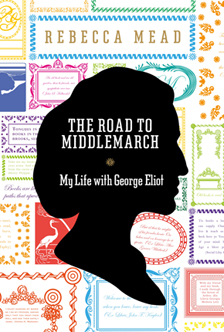Rebecca Mead’s book for life
by Lucy ScholesJust like Rebecca Mead, I too first read George Eliot’s Middlemarch as a seventeen-year-old impatiently waiting for my life to begin in the small town in which I grew up. Unlike Mead, however, I struggled with the century-old study of provincial life. My resistance to the text exacerbated by the fact I was studying it for my A-Levels, so my encounters with it mostly took place in a stuffy classroom, my English teacher insisting on spending an inordinate amount of time reading the novel out loud to us, like a primary school storytime session.
“Your teacher must have really loved the novel,” says Mead when I tell her this, and her instant empathy with this long-distant figure from my past suddenly makes me look back on those lessons with a new sympathy and understanding of my own.
This early moment in our conversation sums up in miniature the essence of Mead’s book The Road to Middlemarch, an extraordinarily powerful mixture of literary criticism, biography and personal memoir charting Mead’s “profound experience” with Eliot’s novel as she examines how what we read shapes how we choose to live our lives, and how, in turn, these choices shape what we read. The notion of sympathy, Mead explains to her readers, is extremely important to Eliot’s work: it was “a far more resonant term in the Victorian era than it tends to be today, when it is often understood to mean no more than ‘feeling sorry for.’ When Eliot and her peers used the word, they meant by it the experience of feeling with another person: of entering fully, through an exercise of imaginative power, into the experience of another.” So keenly does The Road to Middlemarch demonstrate Mead’s powers of sympathy – with Eliot, with Eliot’s characters, and with Mead’s own family – that reading this, a little over halfway through her book, I felt she could just as easily have been reflecting on her own writing as that of her subject. The book has prompted, she tells me, a certain type of question from people – What did you learn from Middlemarch? Or, How did it direct your life? – and the answer is precisely this, “that sympathetic mood, that paradigm.”
Now in her forties and living in Brooklyn, Mead isn’t the same person as the seventeen-year-old schoolgirl in an English seaside town who read Middlemarch for the first time, but it’s a novel that she’s returned to over and over again; through her undergraduate years at Oxford, her early years as a journalist in New York and the romantic misadventures of her twenties, to her current incarnation as an established staff writer at The New Yorker and a wife and mother. Middlemarch – described by Virginia Woolf as “one of the few English novels written for grown-up people” – has grown with Mead, and with each return to the text she understands something afresh in its pages. “A book may not tell us exactly how to live our own lives, but our own lives can teach us how to read a book,” she explains.
There’s a graceful arc to the study, one that begins with Mead’s adolescent self, eager for adventure and excitement beyond the confines of the world she grew up in, and ends with a reassessment of what home and family can mean, focusing on her parents’ marriage, something she now sees as its own “grand, domestic adventure”. Through Fred and Mary, characters for whom Mead admits she had little time when she encountered them as a younger reader – betrothed since children, their relationship seemed staid, predictable and dull – Mead came to understand her own parents’ relationship in a deeper, more sympathetic way.
“When I turn to the last pages of Middlemarch and read about Fred and Mary,” she writes, “I think of my parents, who met when they were barely past childhood, and who grew white-haired together; until in the hours before dawn one winter morning, nearly sixty years after their wedding day, my father died with my mother at his side, holding his hand and speaking softly to him of sweet memories in common. Middlemarch gives my parents back to me. In the pages of my imagination they are still together, watching me and watching over me from the window of their lives, under the pale sunlight of the place I came from and still call home.”
This is a deeply moving account of a daughter’s love for her parents, and an understanding of their relationship beyond the confines of their roles as her mother and father, but the idea that this has been made possible because of a novel is fascinating. We talk so often, Mead writes, of “getting lost in a book”, but it’s the flipside of this, the idea of being found in one, that propels The Road to Middlemarch: “when a reader is grasped and held by a book, reading does not feel like an escape from life as much as it feels like an urgent, crucial dimension of life itself.”
Mead’s father, whose health had been ailing for some time, passed away while she was writing the book – exactly halfway through, just as she finished the fourth of its eight chapters – so, “in addition to the emotional intensity that comes from going back and looking at your own childhood and your own history, doing that while pivoting around life and death made for a very intense experience,” she explains.
She mentions she’s just read Gary Shteyngart’s memoir Little Failure, another “midlife honouring of one’s parents”, something that isn’t particularly common these days: “Our culture is very much about distance, and yet it’s not so long ago that fidelity to one’s parents was an enormous part of life. I don’t want to overstate my daughterly devotion, but I dedicated the book to my parents because it was their book.”
I never thought I was going to write a memoir, I didn’t have anything to remember, and I would not have written one without writing through the prism of this book.”
When I ask her if she always envisaged a book that was so personal she tells me no, it was something that arose somewhat organically in the course of the writing process. Back when she was first thinking through her then-embryonic ideas about Middlemarch, she wrote a piece on the subject for The New Yorker. It was only after she’d presented a first draft of this to her editor, and he explicitly encouraged her to put more of herself in it and truly make her relationship with the novel the central theme, that she felt she’d been granted the “permission” to do so. “I literally rewrote the beginning of the piece. It had begun with a description of Griff House, where George Eliot grew up, but instead of beginning with her, I began with my childhood, more or less the same as the beginning of the book. I never thought I was going to write a memoir,” she continues, “I didn’t have anything to remember, and I would not have written one without writing through the prism of this book.”
Her use of the word prism aptly describes her delicate position in the text, dependent on an artful refraction of the self, and her classification of it as “an intensely personal book while not being a confessional one” is clarifying. Reading Middlemarch in light of both Eliot’s life and her own experiences, Mead identifies threads of this experience “woven deep into the fabric of the novel – not as part of the book’s obvious pattern, but as part of its tensile strength.” I love this idea, and Mead’s elegant terminology, not least because it also perfectly describes the way in which she inhabits The Road to Middlemarch: always there, as both author and subject, everything is refracted through her sensibility, yet she remains somewhat elusive, slightly out of focus or just out of the frame, too gifted a writer to drift into the unbordered realm of autobiography.
She may never quite be centre-stage herself in the text, but her love of the novel remains crystal clear throughout, something that dictated the scope of her work from the moment of its conception – “If I was going to write about anything, it was going to be about something I loved” – and this is a fundamental part of the deeper framework of the project in terms of what Mead’s doing with the novel and what it’s doing with her. Middlemarch has “disciplined [her] character”, become part of her “experience and endurance”, it inspired her when she was young, and has continued to speak to her since. “Most serious readers,” she writes, “can point to one book that has a place in their life like the one Middlemarch has in mine. I chose Middlemarch – or Middlemarch chose me – and I cannot imagine life without it.”
Rebecca Mead is a staff writer for The New Yorker. Born and educated in England, she left for the US in her twenties and has written for newspapers and magazines including the London Review of Books and the New York Times Book Review. The Road to Middlemarch is published by Granta Books.
rebeccamead.com
Lucy Scholes is contributing editor at Bookanista and a literary critic and book reviewer for publications including the Daily Beast, the Independent, the Observer and the TLS. She also teaches courses at Tate Modern and Tate Britain.
Follow Lucy on Twitter: @LucyScholes



